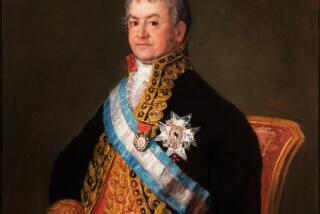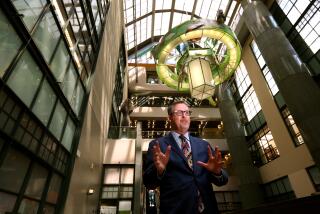Masterpieces of literature get a new look at the Huntington Library
One of the great cultural jewels of the West is back, with a wonderful new polish.
When the Huntington Library in San Marino reopened its main exhibition hall on Friday for a special press preview after a 17-month renovation, you could almost feel the presence of its namesake at the front door.
Henry Edwards Huntington was a railroad baron who assembled one of the most magnificent collections of books, manuscripts and letters in private hands. On Friday it gleamed again, inside new displays (illuminated with heat-free fiber optic lighting) that highlight the grandeur of Huntington’s collecting ambition.
Entering the old hall (built in 1920), one turns to the left and encounters one of the oldest books in the collection, a manuscript of Geoffrey Chaucer’s “Canterbury Tales” (written circa 1400). Huntington bought it from the Earl of Ellesmere in 1917, and it’s the source of most editions of the “Canterbury Tales” available today.
A few paces away there’s a Gutenberg Bible, and a first edition of John Milton’s 1667 poem “Paradise Lost.” On the other side of the 3,400-square-foot room, largely unnoticed during the preview, rests a First Folio edition of Shakespeare’s collected plays, opened to the title page, with its iconic engraving of the bald bard of Stratford himself. Near the back of the room there are Henry David Thoreau’s scribbles on the galleys of “Walden.”
Huntington died in 1927, but thanks to a big endowment his library has kept on collecting books, photographs and posters and other ephemera. Not long ago, for example, it obtained the papers of the novelist Octavia Butler. For two years, as they planned the main exhibition hall’s renovation, the Huntington Library staff faced a unique problem.
As Karina White, the designer of the new exhibit put it: “How do we choose from 9 million objects?”
Working with the Huntington’s curators, White designed the new exhibit around 12 “key objects.” In addition to the aforementioned works of Shakespeare, Milton and others, there is a map of Tenochtitlan that the conquistador Hernan Cortes had made after he destroyed that Aztec city; letters by Abraham Lincoln and Susan B. Anthony; and the manuscript of a Jack London novel that met a strange fate.
Other artifacts from the same historical period surround each object. In all there are about 150 objects in the room. When you enter, you are greeted by handwritten documents from the late Middle Ages; and when you leave your final glance is of two panoramic photographs of the undeveloped Southern California landscape at the beginning of the 20th century.
“We needed to tell better stories about the material,” said library director David S. Zeidberg. “We wanted to show how singular things happen in the context of a wider world.”
Perhaps the oddest object in the exhibit tells a story of a literary career, and of one of the biggest catastrophes in California history.
In 1904, Jack London stored the manuscript of his recently completed novel “The Sea-Wolf” in a bank vault in San Francisco. He was paranoid about fire, and had been told the vault was fireproof. When the 1906 earthquake struck, much of San Francisco burned to the ground, including the bank. London’s manuscript was burned to a crisp, and its blackened pages have remained untouched inside the tin case where London stored them ever since.
“It’s so fragile it falls apart if you touch it, so we can’t take it out of the box,” said Sue Hodson, the Huntington’s curator of literary manuscripts.
Now the ashes are on display for the first time, with Hodson and others at the library still hopeful that one day technology will be invented that will allow them to rescue the charred pages and read them for the first time.
The newly renovated main exhibition hall reopens to the public on Saturday.
ALSO:
Quiz: Can you drink like Dorothy Parker?
A year-end spread of bold, inventive photography books
Amazon wants indie bookstores to sell Kindles, but they’d rather not
hector.tobar@latimes.com
More to Read
Sign up for our Book Club newsletter
Get the latest news, events and more from the Los Angeles Times Book Club, and help us get L.A. reading and talking.
You may occasionally receive promotional content from the Los Angeles Times.









